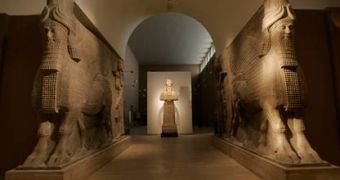Babylon was a Mesopotamian city state, a "holy city" located in the region of the modern Al Hillah, Babil Province in Iraq, approximately 85 kilometers (55 miles) south of the Iraqi capital, Baghdad. The history of Babylon started at the dawn of the 3rd millennium BC and, throughout its lifespan, it comprised some of the world's most important heritages, such as the code of King Hammurabi, the Hanging Gardens (one of the seven wonders of the ancient world), the Gates of Ishtar or the Biblical tower of Babel.
There is only a scarce trace of the ancient marvels still surviving today in the region. Besides the inexorable work of time, humans also contributed a great deal to the destruction of the site. The former Iraqi dictator, Saddam Hussein, started a process of poor reconstruction of the old city's wonders, but he did so in a non-scientific way that would instead glorify his own name. Many of the old monuments' bricks were carved with an inscription reading "This was built by Saddam Hussein, son of Nebuchadnezzar, to glorify Iraq". World-famed specialists preferred not to get involved due to the war, Saddam's ruling or sanctions by the UN.
He had his experts build the new monuments over the ancient ruins, on artificial hills, which further buried and damaged the original items. The invasion of US and Polish troops in 2003, which transformed the city into a military base, caused even more damage to the site, with heavy vehicles roaming around and with a tremendous number of looting activities going on. According to Gaetano Palumbo from the World Monuments Fund in New York, quoted by the Associated Press, in its current state, Babylon is "hardly understandable, as a place where so much happened in history".
There was no proper archaeological activity going on in the region for more than a century, so the condition of the original artifacts and monuments is not known. But the region's high risk, as well as the lack of security and conservation methods prevent further research. Also, the Iraqi government is focused on different priorities at the moment, and getting Babylon on UNESCO's list of World Heritage sites is still years away. But the US wants to compensate for the damage caused and promised to help funding the efforts of rescuing Babylon.

 14 DAY TRIAL //
14 DAY TRIAL //